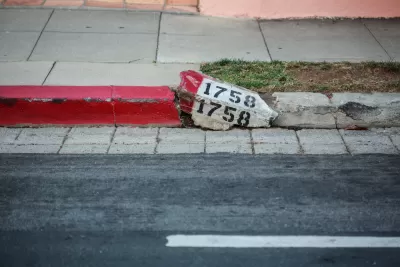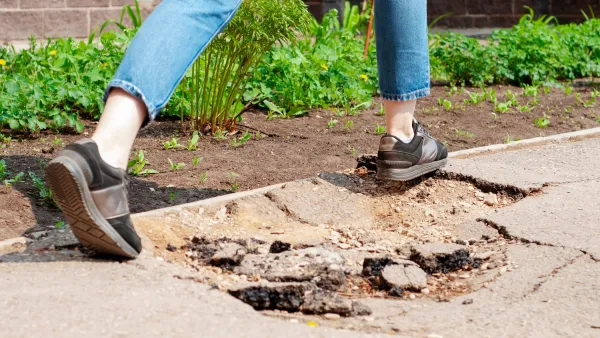San Diego quest to find solutions to repairing damaged city sidewalks continues, with home and business owners potentially facing liability for trip-and-fall accidents

Liam Dillon of The Voice of San Diego reported last week that San Diego's murky policy on sidewalk repairs remains murky after two-years of study and discussion. A study conducted by the city "found almost 80,000 locations with significant cracks, lumps or other problems."
The current law puts the impetus for sidewalk repairs on property and business owners, while the city is legally responsible for pedestrian injuries resulting from accidents caused by poorly maintained sidewalks. A new ordinance could make property owners legally responsible for sidewalk-related accidents occurring in front of their property, while the city shifts a portion of the cost for sidewalk repair from the property owner back to the city.
This week, the City Council sought to provide some clarity on the issue, however a final policy identifying who will pay for needed repairs may not come until next year, reports David Garrick of The San Diego Union-Tribune. "The issue will be revisited in January when city staff is scheduled to unveil a new standard for acceptable sidewalk conditions, a schedule for fixing the needed repairs across the city and a plan to pay for those repairs." The $57 million required to repair damaged sidewalks is part of an estimated $5 billion backlog in infrastructure repairs that the city must cover, forcing a rethink of current policies.
FULL STORY: Two Years On, Illogical Sidewalk Policies Still Illogical

Planetizen Federal Action Tracker
A weekly monitor of how Trump’s orders and actions are impacting planners and planning in America.

Restaurant Patios Were a Pandemic Win — Why Were They so Hard to Keep?
Social distancing requirements and changes in travel patterns prompted cities to pilot new uses for street and sidewalk space. Then it got complicated.

Map: Where Senate Republicans Want to Sell Your Public Lands
For public land advocates, the Senate Republicans’ proposal to sell millions of acres of public land in the West is “the biggest fight of their careers.”

Maui's Vacation Rental Debate Turns Ugly
Verbal attacks, misinformation campaigns and fistfights plague a high-stakes debate to convert thousands of vacation rentals into long-term housing.

San Francisco Suspends Traffic Calming Amidst Record Deaths
Citing “a challenging fiscal landscape,” the city will cease the program on the heels of 42 traffic deaths, including 24 pedestrians.

California Homeless Arrests, Citations Spike After Ruling
An investigation reveals that anti-homeless actions increased up to 500% after Grants Pass v. Johnson — even in cities claiming no policy change.
Urban Design for Planners 1: Software Tools
This six-course series explores essential urban design concepts using open source software and equips planners with the tools they need to participate fully in the urban design process.
Planning for Universal Design
Learn the tools for implementing Universal Design in planning regulations.
Heyer Gruel & Associates PA
JM Goldson LLC
Custer County Colorado
City of Camden Redevelopment Agency
City of Astoria
Transportation Research & Education Center (TREC) at Portland State University
Camden Redevelopment Agency
City of Claremont
Municipality of Princeton (NJ)





























